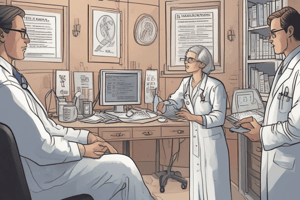Podcast
Questions and Answers
What is a primary purpose of documentation in patient records?
What is a primary purpose of documentation in patient records?
- To serve as a historical record for future evaluations
- Only for legal purposes
- To increase hospital revenue
- To facilitate communication among healthcare providers (correct)
Which statement best describes the legal implications of patient documentation?
Which statement best describes the legal implications of patient documentation?
- Care not documented is perceived as care not provided (correct)
- Documentation only matters if a patient is unsatisfied with care
- Documentation is solely a requirement for reimbursement claims
- All documentation is optional as long as verbal communication occurs
How does documentation affect reimbursement processes in healthcare?
How does documentation affect reimbursement processes in healthcare?
- Documentation details are essential for verifying services provided (correct)
- Only billing codes are relevant for reimbursement
- Patient complaints are the main drivers for reimbursement claims
- Reimbursement is automatic regardless of documentation
What role does documentation play in the education of healthcare students?
What role does documentation play in the education of healthcare students?
In the context of auditing, what is the significance of patient documentation?
In the context of auditing, what is the significance of patient documentation?
What is the primary reason nurses must keep patient information confidential?
What is the primary reason nurses must keep patient information confidential?
Which practice is most important for ensuring the security of patient records?
Which practice is most important for ensuring the security of patient records?
What is a requirement for documentation according to Joint Commission standards?
What is a requirement for documentation according to Joint Commission standards?
When documenting patient information, what should be omitted to ensure confidentiality?
When documenting patient information, what should be omitted to ensure confidentiality?
Why is it important for nurses to access only the medical records necessary for patient care?
Why is it important for nurses to access only the medical records necessary for patient care?
What should be documented in a patient record to ensure accurate communication?
What should be documented in a patient record to ensure accurate communication?
Which of the following actions is considered a legal violation in documentation?
Which of the following actions is considered a legal violation in documentation?
What is a principle that should be followed to enhance legal prudence in documentation?
What is a principle that should be followed to enhance legal prudence in documentation?
What does the acronym EHR stand for in the context of patient records?
What does the acronym EHR stand for in the context of patient records?
What should be avoided to maintain the integrity of a medical record?
What should be avoided to maintain the integrity of a medical record?
Which of the following best describes the responsibility associated with signing a document in a medical record?
Which of the following best describes the responsibility associated with signing a document in a medical record?
What is one of the patient rights regarding their medical records?
What is one of the patient rights regarding their medical records?
When documenting a patient's response to treatment, which of the following is important?
When documenting a patient's response to treatment, which of the following is important?
Study Notes
Confidentiality
- Patients have the right to privacy and confidentiality.
- This means their medical information should be kept private and not disclosed without their consent.
- Nurses have a legal and ethical obligation to keep patient information confidential.
- They are responsible for protecting patient records from unauthorized access
- HIPAA requires that the disclosure of health information is limited to the minimum necessary.
Student and Staff Role
- Students and staff must be aware of how they collect and transport patient data.
- They should not include any patient identifiers on their paperwork, including birth date, social security number, room number, name, name of the facility or medical record number.
- They should access only patients’ medical records for information needed to provide safe and effective patient care.
- All record access is tracked.
- Documentation is part of a legal record, and students and staff are responsible for their documentation.
Documentation Standards
- Current standards require an assessment before and throughout patient care, including physical, psychosocial, environmental, self-care, patient education, knowledge level, and discharge planning needs.
- The Joint Commission standards require that documentation be within the context of the nursing process, including evidence of patient and family teaching and discharge planning.
Forms of Documentation
- Records or charts are confidential permanent legal documents, both paper and electronic.
- Reports are oral or written, such as those from radiology technicians, MLTs, and nurses.
- Conferences involve team members communicating in a group, such as with prescribers and clinical pharmacists.
- Referrals are arrangements for services by another care provider, such as OT, PT, or Social Worker.
Purposes of a Patient Record
- Communication is essential for safe and effective care, both between healthcare professionals, and with the patient and family.
- Legal documentation is crucial, as the adage goes "Care not documented is care not provided."
- Reimbursement for healthcare services often relies on accurate documentation.
- Education is facilitated by patient records, allowing students to review cases and provide safe and quality care.
- Research uses statistical data from patient records to change procedures and policies.
- Auditing and monitoring formally review documented patient care to improve quality of care.
Legal Guidelines for Documentation
- All medical records are subject to review, including by the Center for Medicare/Medicaid, the Joint Commission, courts of law, risk management, and patients themselves.
- Poor documentation can lead to issues ranging from poorly done care to potential fraud.
Good Documentation Characteristics
- Facts include observed behaviors, services rendered, and the patient's response to services.
- Specific, clear, complete, concise, timely, and sequential documentation is crucial for effective communication and legal protection.
Patient Rights to Medical Record
- Patients have a right to their medical record.
- They must go through a formal process to obtain a copy.
- Electronic Health Records (EHR) have increased access to progress notes, nurse's notes, and healthcare results.
Legal Guidelines for Documentation
- Paper documentation:
- Write legibly in black ink.
- Write words out. Do not use abbreviations unless approved by the organization.
- Never chart in advance or under someone else’s documentation.
- Never change someone’s documentation.
- Content:
- Document facts, subjective and objective information.
- Do not enter personal opinions.
- Document in a timely manner.
- Signatures:
- Sign documents as directed by the facility.
- Typically, this is done with First initial, Last name, Title (Student Nurse)
- Begin each note entry with the date/time using a 24 hour clock and end with your signature and title.
- A nurse's signature on an entry in a record designates accountability for the contents of that entry.
Documentation Principles
- When writing documentation, remember to be:
- Accurate
- Sequential
- Appropriate
- Complete
- Concise
- Legally prudent
Legal Guidelines for Recording
- Do not leave blank spaces or lines in nurses’ notes.
- Correct format sample:
01-01-29 0800 Dr
- --
Studying That Suits You
Use AI to generate personalized quizzes and flashcards to suit your learning preferences.
Related Documents
Description
This quiz evaluates your understanding of confidentiality in healthcare settings, focusing on legal obligations under HIPAA and the roles of students and staff in protecting patient information. It emphasizes the importance of privacy, documentation, and responsible access to medical records.




